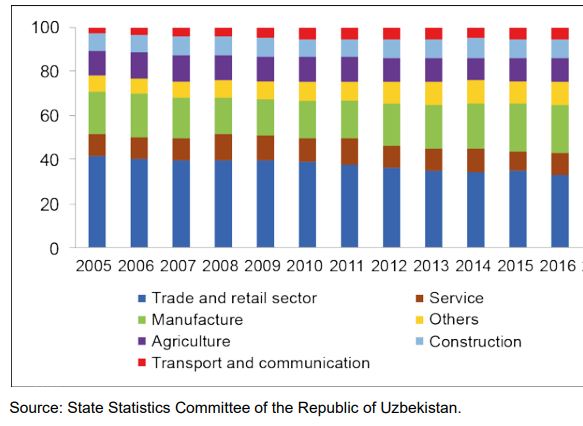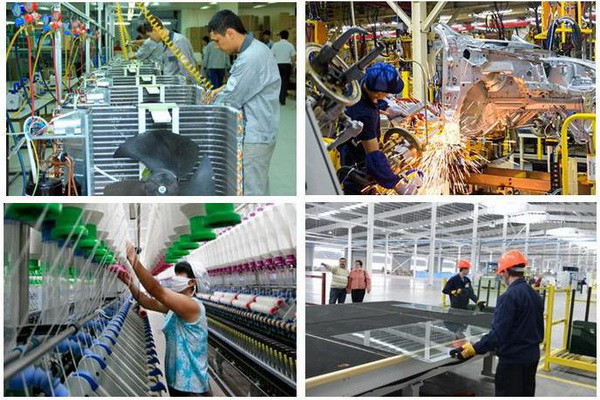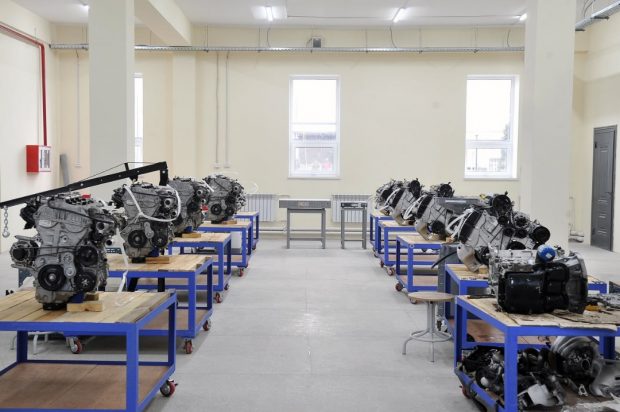The Republic of Uzbekistan is on its way to greater socio-economic prosperity through its National Job Creation and Employment Program. This has not been achieved in a single day but is a gigantic effort on the part of decision makers, especially its visionary leader/president H.E. Islam Karimov who allocated and channelized all resources to attain the goals of macro-economic stability and sustainability. Now, it has one of the highest employment ratios in Central Asia and Caucasus.
Economic Value of New Job Creation
New job creation has direct correlation with stable macro-economy. It is the outcome of national economy’s sustainability. The Republic of Uzbekistan has initiated many meaningful measures to create more and more jobs for its people in different associated sectors of economy.
Direct Correlation
New job creation also has direct correlation with macro-economy stability and sustainability and is of course the outcome of constant economic sustainability. It creates social harmony, promotes peace, encourages innovations and minimizes chances of any societal eruption. In the recent past, unemployment played very important role in the Arab Spring which mitigated all efforts of damage control of many regional countries of Middle East and North Africa (MENA). Unemployment is a double-edge sword which creates havoc.
Socio-Economic Value of New Jobs
The recent violent clashes in some countries of Latin America and the European Union, especially Greece and Spain all reconfirm the socio-economic value of new jobs. Even Tajikistan and Kyrgyzstan are confronted with the wrath of its unemployed people, especially youth. Thanks to strategic vision of H.E. Islam Karimov, Uzbekistan has never experienced any incident of violent protest owning to unemployment.
Uzbekistan’s Unique Model of Economic Growth
Uzbekistan has its own unique model of economic growth which is still functional and producing astonishing results in shape of higher GDPs, investments, industrialization, foreign trade, innovations and green revolution. Its system produces new jobs at source which is remarkable. It has become one of its foremost national priorities to create more and more new jobs on regular basis. This shows its high level of socio-economic prosperity, highlights its economic of happiness and speaks volumes about its pursuits of greater socio-economic stability and smarter economy.
People: A Valuable Resource
According to Uzbekistan’s National data (2015-16), it has a growing population that has exceeded 32 million people. The people are playing an important role in the socio-economic development of the republic. Every year, under the guidance of its president H.E. Islam Karimov Uzbekistan implements a target job creation and employment program, which is developed by the government and approved by the parliament. Its new job creation system is a blessing which follow a holistic approach. It is second to none in the world.
Uzbekistan’s National data (2015-16)
According to Uzbekistan’s National data (2015-16), more than 980,000 jobs were created in the country during 2015 with more than 60 percent of jobs in rural areas. Over 480,000 graduates of vocational colleges were employed in the last year. The largest number of new jobs was established in Samarkand, Ferghana, Tashkent, Kashkadarya, Andijan and Bukhara regions and in the capital city which is among the densely populated regions.
Multiplier Effects of free Trade and Economic Zones
Uzbekistan has many free trade and economic zones throughout the country which have great socio-economic value. Furthermore, special industrial zones in Navoi, Tashkent and Jizzakh regions have been a remarkable factor for the creation of workplaces: the special zones provide many tax exemptions and preferences for investors, which contributes to the development of high-tech industries. It stimulates new jobs in the operating manufactures, and other associated sectors of national economy i.e. transport, construction, social infrastructure.
Contributions of Mega Uzbekistan’s Firms/Corporations
Prominent companies like O’zbekyengilsanoat, O’zkimyosanoat, Uzbekneftegaz and others have been effectively addressing the employment problem through the construction of new and existing facilities in the country. Local talent and youth are being hired and inducted in the mega organizations/corporations in the country. It is a value-addition in the overall system of production and productive channels.
Revival Sick Units Contribution
Revival of sick industrial units and failing industries has provided more than 30,000 jobs during 2015 and has further strengthened its national drive of employment creation. Local population of Samarkand, Namangan and Ferghana regions and the capital got the maximum new jobs. It is a ideal combination of mechanisms of implementation of target ‘road maps’ on rehabilitation of the financial and economic state of low profit and unprofitable enterprises, abolishment of unpromising facilities and their onward sale to the new owners under the condition of creation of production capacities and jobs.
Role of Farming Enterprises
The development of farming enterprises that deal with the production of foods and non-food products have also provided employment to more than 127,500 people in many regions of the country. Diversified farms have played an important role. Privileges on single land tax payments and lending have empowered them to expand the production and establish new processing plants, which have a positive impact on rural employment.

Special Role of Small Businesses
Small is beautiful and useful. Failing big corporation and firms have opened a new window of opportunity for Small and Medium Enterprises (SMEs) around the globe. Uzbekistan is the true supporter and initiator of SMEs in the CIS. Wide spread acceptance of small businesses has revolutionized its business potential. Its entrepreneurial structure has been playing a remarkable role in addressing employment problems in the country. Small business and private entrepreneurship has now become strategic assets to Uzbekistan with both sector’s contribution to GDP are very high and constant. Now, the share of small businesses in employment is up over 76 percent.
The rapid development of small enterprises and micro-firms during 2015 ensured employment of over 290,000 people. Moreover, the sector plays a dominant role in all regions, particularly in Tashkent.
Role of Commercial Banks Credits
Credit is acts like oxygen to any kind of business entity. It is oil to engine of industrialization. It accelerates business and economic activity in the country. Uzbekistan has its own unique system of credit facilities. According to Uzbekistan’s National Data (2015-16) and Central Bank commercial banks allocated 8.5 trillion soums for small businesses in 2015. Concessional loans are normally allocated for the projects that envisage creation of jobs in remote rural areas.
Promotion of Small Businesses & SMEs
The Uzbekistan’s government has already initiated many incentives for the development of the rapid development of all kinds of small business, SMEs and Micro-finances in the country due to which a relatively low fixed rate of single tax payment for small businesses and micro-firms of 5 percent for the industry, and 10 percent for trade and catering enterprises, as well as other measures on support of exports of small businesses and entrepreneurs is an important incentive for creation of jobs in the sector.
Uzbekistan’s Incentive Oriented Policies
Uzbekistan has institutionalized incentive oriented policies for the further strengthening of small businesses and SMEs in the country. It empowers its people especially women who are the main recipient of government and commercial banks concessional loans. Now, Uzbekistan has highest woman empowerment in the region. It eradicates gender discrimination in the country that is why women are playing their important role in the macro-economy of the country.
Role of Financial and Economic Derivatives
Financial and economic derivatives for the development of individual entrepreneurship have been providing fixed tax rates for the individuals who are engaged in business activities without establishing a legal entity, including those who are engaged in retail trade of food products, agricultural products in farm food markets, in the production and marketing of their own products, or provision of household services.
Role of home-based work/job
In Uzbekistan all forms of home-based work/jobs have been rapidly developing in recent years, including those running in cooperation with companies on labor contracts, crafts and family entrepreneurship. In 2015, they contributed to the employment of more than 203,000 people, mostly women, people with disabilities, and other socially vulnerable categories of the population. It patronizes cottage industry and promotes craftsmanship in its people especially rural population.
Uzbekistan’s Laws
Uzbek Law ‘On Family Business’ which ensured favorable conditions for this key form of private enterprise has played a tremendous job with family business being subject to all the privileges, preferences and guarantees, as provided by the law for small businesses. Moreover, a family business implies the opportunity of reasonably flexible working schedule and division of labor, which allows occupation of normally unemployed categories of the population, including women with young children.
Role of Vocational Education Centers
Vocation education creates more and more job and opportunities to excel. It is one the key players in so many advanced economies like Japan, Singapore, Germany and Brazil. In Uzbekistan an important feature of the system-based work on employment comes to special attention to the employment of graduates of vocational colleges. It is highly important for boys and girls to immediately start working, once they have gained knowledge in specific disciplines and respective work skills, and are ready to not just practice them, but also to earn, laying the basis of their financial wellbeing.
Integrated measures have been introduced and implemented in each vocational college, as well as in territories and sectors in order to ensure employment of their graduates at source.
Uzbekistan’s vocational education has multidimensional utility. For example, all colleges are attached to certain companies, organizations and sectors of the economy. Experience has shown the positive outcomes of signing tripartite contracts between enterprises, colleges and the students for practical training with subsequent employment in certain enterprises and organizations. Vocational colleges are provided with information about available vacancies for graduates in accordance with their specialization.

Rise to Family Businesses
In recent years, young people have been increasingly involved in entrepreneurship and family business and learning the basics of business management. The maximum number of employees of micro-firms and small enterprises has been increased to 50 percent in case if they employ high school, university or college graduates, as part of creation of favorable conditions for youth employment, and improvement of the business environment.
Uzbek commercial banks have been constantly increasing the amount of soft loans to finance business plans of graduates of vocational colleges. In 2015, they allocated nearly 280 billion soums of concessional loans for the establishment of businesses, which is 1.3 times more YOY.
Uzbekistan National Job Creation and Employment Program: A Great Success
Uzbekistan National Job Creation and Employment Program is a great success. It implies the employment of the capacity of territories and sectors of the economy, rational use of manpower with an eye to demographic factors and structural changes in the economy. It creates strategic cushion to utility the youthfulness of young people in the country. It enhances levels of confidence and sharpens skills. It converts liability (un-skilled youth) to strategic asset (educated labour class and educated people).
It has thoroughly assessed the supply and demand in the labor market, defined the need for jobs in terms of professions for all regions and cities, which has helped to specify employment opportunities for graduates, women, socially vulnerable groups and the unemployed.
According to Uzbek National Job Creation and Employment Program activity areas have been expanded in the framework of targeted programs, establishment of small industrial zones, development of construction, and provision of employment through the bank loans.
It stipulates the application of new but proved methods of employment of population and young people in all districts and cities. For example, as part of involvement of youth in entrepreneurial activities, many colleges organized training courses on preparation for business activity, and created specialized portals ‘Create Your Own Business’.
Achievements
During 2016, this program has introduced the mechanisms of monitoring through the compilation of address lists, specifying the location, timing, a sector profile of the facilities to be commissioned, as well as through the enhancement of performance of the working committees that are responsible for the implementation of the program. The said mechanism will help to identify the enterprises, industries, districts and cities that lag behind the approved parameters of job creation, and take prompt action to remedy the situation.
Targets 2016
The Program for 2016 provides for the establishment of 990,000 new jobs, more than 660,000 jobs of which will be created through the intensified development of small businesses and private enterprises, and service sector. There is a plan to employ more than 510,000 schools and college graduates. According to the estimates, the labor force in 2016 will make up 18.6 million people.
It is planned to occupy the unemployed in the construction of transport, roadside and social infrastructure and standard design housing. About 100,000 jobs have been reserved for the people of disabilities, mothers with many children and others who undergo hardship in the labor market.
Economic Utility of Job Fairs
Job fairs are widely staged activity in the world especially in the West. It is also an effective two-way communication method of hiring in Uzbekistan. It has been an effective way of promoting employment in the country. During these job fairs new jobs are introduced vacancies and provide them with information about the labor market, about the companies in need for workforce, job and retraining opportunities on the basis of the vacancies available. It is planned to hold at least one thousand job fairs this year with the participation of potential employers and the unemployed, covering all cities and districts.
Job fairs are held in many regions, including education institutions throughout the country. There is a complete alumni database, the data of their employment is promptly analyzed and trilateral employment contracts are concluded.
For instance, 50 companies and organizations presented their vacancies at the job fair in Beshariq Vocational College of Agriculture (Ferghana region). This year, the college graduates 850 young men and women. During the fair, students learned about vacancies and labor conditions. More than 100 graduates were forwarded to employers in accordance with their specialty.
Most of the work in this direction is carried out by employment and social protection centers throughout the country. Anyone is welcome to get additional knowledge or learn a new profession, to apply for a job search, or get advice. Social support of professional enthusiasm in women is particularly important, as their economic independence is seen as an important component of a healthy society in all respects.
Each center provides staff training and retraining courses in order to meet the demand in the labor market. They offer training on the most popular professions, including accounting, office management, computer maintenance, modeling and tailoring, health massage, cooking, shoe business, welding, repair and installation of bathroom and lavatory equipment and electrical appliances. Trainees and registered job seekers receive allowance. Employment promotion centers organize job fairs in conjunction with district administrations, vocational colleges and enterprises.

Vocational Training Centers
A Vocational Training Center was established through the grant funds of the Republic of Korea in the Sergely region of Tashkent to provide training and retraining of temporarily unemployed people, including graduates of educational institutions. It offers modern classrooms and practice shops for 360 seats and a dormitory for visitors from the regions of Uzbekistan.
The center provides training and retraining of specialists in the four main areas – the machinery production, electronics and electrical engineering, repair of motor vehicles, information systems and technologies.
Since its inception, the center trained and retrained more than 1,500 young people. Most importantly, none of the center’s graduates stays unemployed. The list of the companies that assisted with practical training and jobs includes the Tashkent Pipe Plant, Tashkent Casting and Mechanical Plant, GM Powertrain Uzbekistan, Bekabad Metallurgical Plant, Uztelekom and many others.
Conclusion
New job creation is the mantra of every country around the globe in order to cope with the tsunami of unemployed youth. New jobs bring new hope of life and better life. New job creation is must to tap the elements of anger, disappointment and above all dissatisfaction among the young people. It backs greater socio-economic stability and maintains crucial sustainability. Right from the beginning, the Republic of Uzbekistan has introduced many effective and result oriented policies and programs to create more and more jobs for its population.
Constant high rates of GDPs and investments have enabled the Republic of Uzbekistan to generate more and more new jobs in different sectors and sub-sectors of national economy. Its smarter economy and knowledge based policies have contributed great job in the field of new job creation.
Uzbekistan has been pursuing an integrated policy to ensure and support the optimal utility of the young people. It provides certain job, a stable source of income to improve his wellbeing and the family budget. There are the opportunities of a feasible labor for those who are limited with physical abilities too.




